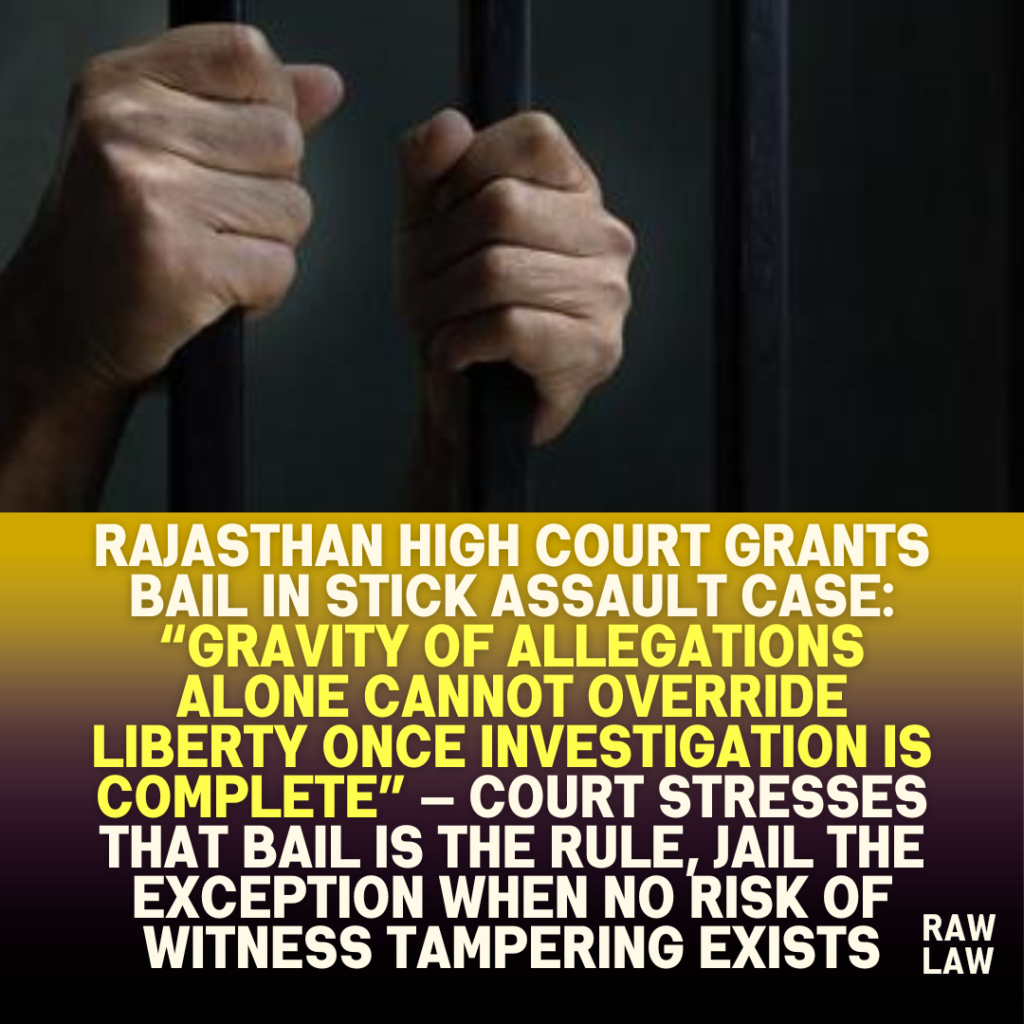Court’s Decision
The Rajasthan High Court at Jodhpur allowed the petitioner’s bail application in a criminal case registered under Sections 115(2), 126(2), 109(1), and 3(5) of the Bharatiya Nyaya Sanhita (BNS), arising from allegations of causing injuries with a stick. The Court, after examining the case diary and available evidence, found no compelling reason to deny bail at this stage. It held that while the allegations were serious, the petitioner had been in judicial custody since 21 June 2025, the investigation was complete, and the trial was likely to take time. The Court directed the petitioner’s release on bail subject to conditions, including furnishing a personal bond of ₹1 lakh and two sureties of ₹50,000 each, and mandated his presence during trial.
Facts
The prosecution alleged that the petitioner assaulted the complainant using a stick, causing injuries. Based on the complaint, the police registered an FIR at Rajiyasar Police Station, Sri Ganganagar, under relevant provisions of the BNS. The petitioner was arrested on 21 June 2025 and has been in judicial custody since then. The investigation was completed, and the charge sheet was filed before the trial court.
The petitioner applied for bail, contending that the allegations were exaggerated, that the injury was inflicted by another accused, and that prolonged incarceration before trial would be unjust. The State opposed the bail plea, emphasising the gravity of the offence and asserting that granting bail before recording the victim’s testimony could influence witnesses.
Issues
- Whether the petitioner was entitled to bail given the nature and gravity of the allegations.
- Whether continued detention was necessary after the completion of the investigation.
Petitioner’s Arguments
Counsel for the petitioner argued that the alleged injury with a stick was caused by another accused, and the petitioner was falsely implicated. He highlighted that the petitioner had been in custody for nearly two months, the investigation was complete, and the trial was yet to commence, indicating a prolonged detention without conviction. It was further argued that bail is the rule and jail is the exception, especially when no likelihood of tampering with evidence or absconding exists.
Respondent’s Arguments
The Public Prosecutor opposed bail, stressing the seriousness of the offence and the nature of the assault. It was argued that the victim’s testimony was yet to be recorded, and releasing the petitioner could create an apprehension of undue influence over witnesses. The State maintained that given the allegations, pre-trial detention was justified to preserve the integrity of the proceedings.
Analysis of the Law
The Court applied settled principles governing bail under criminal law, particularly focusing on the presumption of innocence, the need for a fair trial, and the balance between individual liberty and societal interest. It reiterated that gravity of offence alone is not a conclusive ground to deny bail if the accused has been in custody for a significant period, the investigation is complete, and the trial is likely to be delayed. The Court emphasised that pre-trial detention should not become punitive.
Precedent Analysis
The order implicitly reflects principles laid down in landmark Supreme Court judgments such as:
- State of Rajasthan v. Balchand — “Bail is the rule and jail is the exception.”
- Sanjay Chandra v. CBI — Gravity of the offence should not overshadow considerations of prolonged detention and trial delay.
- Gudikanti Narasimhulu v. Public Prosecutor — Bail decisions must balance the presumption of innocence with potential risks to justice.
These cases reinforce that pre-trial liberty is a constitutional right unless compelling reasons for denial exist.
Court’s Reasoning
The Court noted that the case diary clearly indicated the role of another accused in causing the main injury. Since the investigation was concluded and no direct evidence suggested the petitioner would tamper with witnesses or abscond, continued detention was unwarranted. It held that denying bail merely on the basis of the seriousness of allegations, without assessing the factual matrix and circumstances, would be unjust.
Conclusion
The High Court allowed the bail application and ordered the petitioner’s release upon furnishing a personal bond of ₹1 lakh and two sureties of ₹50,000 each to the satisfaction of the trial court. It imposed conditions ensuring his appearance during trial and warned that any breach would lead to immediate cancellation of bail.
Implications
This order reiterates the judicial commitment to balancing personal liberty with the interests of justice, emphasising that bail should not be denied solely due to the gravity of allegations when the investigation is complete and no risk of interference exists. It also reinforces the constitutional principle that pre-trial detention must not serve as punishment.
FAQs
1. What did the Rajasthan High Court emphasise while granting bail?
The Court stressed that gravity of allegations alone cannot justify denying bail if the accused has been in custody for a considerable time, the investigation is complete, and there is no likelihood of tampering with evidence.
2. What were the bail conditions imposed?
The petitioner must furnish a personal bond of ₹1 lakh with two sureties of ₹50,000 each and ensure his presence during trial. Any breach of these conditions will result in bail cancellation.
3. How does this decision align with Supreme Court precedents?
It follows the principles in Balchand, Sanjay Chandra, and Gudikanti Narasimhulu, which underscore that bail is the rule, jail the exception, and pre-trial detention should be preventive, not punitive.



